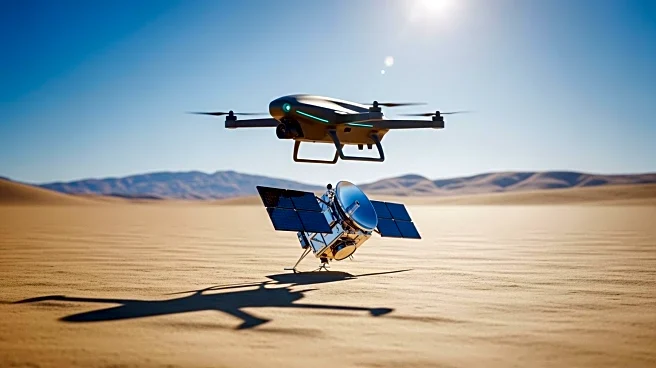What's Happening?
Silicon Valley venture capitalists are increasingly investing in defense startups located in Southern California, marking a significant shift in the region's investment landscape. This change is driven by geopolitical tensions, particularly with China, and the evolving nature of warfare, such as the use of drones in the Russia-Ukraine conflict. Mach Industries, a Huntington Beach-based startup, exemplifies this trend, having received $185 million in venture funding. The company, founded by Ethan Thornton, focuses on developing advanced weaponry, including vertical takeoff cruise missiles and stratospheric bombs. Other notable startups benefiting from this investment surge include Aduril Industries, Impulse Space, and Chaos Industries, which collectively raised billions in venture capital. This shift reflects a broader trend where Silicon Valley is embracing defense technology, a sector it previously avoided due to ethical concerns.
Why It's Important?
The increased investment in defense startups in Southern California has significant implications for the U.S. tech and defense industries. It signals a growing recognition of the importance of technological innovation in national security. As venture capitalists and tech companies like Google and Microsoft engage more with defense contracts, the integration of advanced technologies such as AI into military applications is likely to accelerate. This could enhance the U.S. military's capabilities, potentially deterring conflicts and maintaining geopolitical stability. However, it also raises ethical concerns about the use of technology in warfare, which could lead to increased scrutiny and debate within the tech community and society at large.
What's Next?
The trend of investing in defense startups is expected to continue, with more venture capital flowing into the sector. This could lead to further advancements in defense technology, including AI and autonomous systems. As these technologies develop, they may become integral to U.S. military strategy, influencing defense policies and procurement processes. Additionally, the involvement of tech giants in defense contracts may prompt discussions on ethical guidelines and the role of technology in warfare. Stakeholders, including government agencies, tech companies, and civil society groups, will likely engage in ongoing dialogue to address these issues.
Beyond the Headlines
The shift towards defense investments in Silicon Valley may have long-term cultural and ethical implications. Historically, the tech industry has been wary of military contracts due to concerns about surveillance and weaponization. As this attitude changes, it could alter the industry's culture, potentially leading to a reevaluation of corporate values and priorities. Furthermore, the integration of AI and other technologies into defense systems raises questions about accountability and the potential for unintended consequences, such as autonomous weapons systems making decisions without human oversight.








